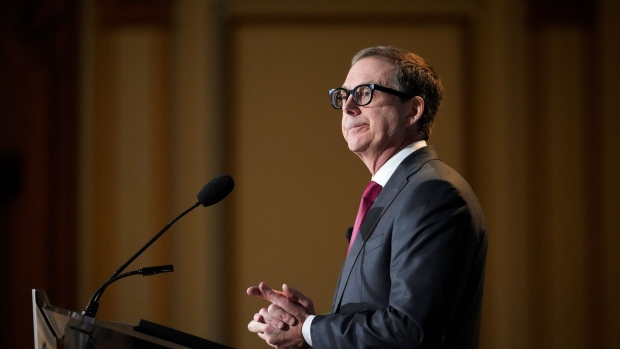Feb 7, 2023
Macklem Defends Bank of Canada Rate Pause as Growth Grinds to Halt
, Bloomberg News

(Bloomberg) -- Governor Tiff Macklem said the Bank of Canada needs to keep interest rates steady to avoid slowing the economy too much, defending his decision to pause hikes in remarks that were accidentally leaked.
In his first speech since declaring a conditional pause on rate increases, Macklem said it can take 18 to 24 months to see the full effects of higher borrowing costs. Policymakers, he added, want to avoid overtightening. The central bank’s benchmark rate has risen from 0.25% to 4.5% since March.
The prepared text of the speech was inadvertently published on the central bank’s website at 12:18 p.m. New York time, 12 minutes ahead of the scheduled release. It was quickly removed, but some investors saw snippets of it.
The yield on Canada’s two-year benchmark bond, which had been rising, began to fall at around 12:19, then lurched downward when the text was republished at 12:30 p.m.
Bank of Canada spokesman Paul Badertscher confirmed the accidental release of the text. “It was subsequently removed and then published at the correct time. The bank is reviewing its procedures to ensure it maintains its long-held high standards for publishing content in line with committed embargo times,” he said in an emailed statement.
The two-year yield was at 3.975% as of 12:19 p.m. and dropped as low as 3.9161%. Then it reversed course and was back at 3.975% again at 2:11 p.m., as Federal Reserve Chair Jerome Powell moved global markets by saying more rate increases will be needed to cool inflation if the labor market stays hot.
The situation in Canada, however, is different.
“We need to pause rate hikes before we slow the economy and inflation too much,” Macklem told a business luncheon audience in Quebec City. “We shouldn’t keep raising rates until inflation is back to 2%.”
While annual price gains in Canada are running at 6.3%, “recent developments have reinforced our confidence that inflation is coming down,” Macklem said, reiterating a forecast for the headline rate to fall to 3% by midyear.
Two weeks ago, the Bank of Canada raised interest rates for an eighth consecutive time and said it intended to pause its tightening campaign, should economic developments evolve in line with forecasts.
In Tuesday’s speech, Macklem laid out key metrics his officials will be watching. Price gains for services need to slow, wage growth and inflation expectations need to moderate, and businesses need to normalize their price-setting behavior.
“If those things don’t happen, inflation won’t come back to our 2% target, and additional monetary tightening will be required,” Macklem cautioned.
The governor said he expects growth in output to be “close to zero” in the first three quarters of this year, which will allow the economy to move from excess demand to modest excess supply and “relieve inflationary pressures.”
The speech didn’t make any reference to what conditions could prompt a rate cut.
However, the central bank released survey results Monday that show financial market players expect the bank will reduce its overnight lending rate to 4% by the end of the year, from 4.5% currently — the highest it’s been in 15 years.
Macklem took questions from reporters after Tuesday’s speech. He reiterated the bank is seeing hopeful signs that underlying price pressures are beginning to abate, and that it’s “far too early” to be considering cuts.
On Wednesday, the Ottawa-based central bank will publish a summary of its Jan. 25 rate-decision deliberations. The minutes-like document will mark the first time the public gets a window into the workings of the six-person governing council, which is led by Macklem and makes decisions by consensus.
--With assistance from Esteban Duarte.
(Updates market reaction, adds Bank of Canada spokesperson’s comment. An earlier version corrected the day of the week in the second-last paragraph.)
©2023 Bloomberg L.P.





